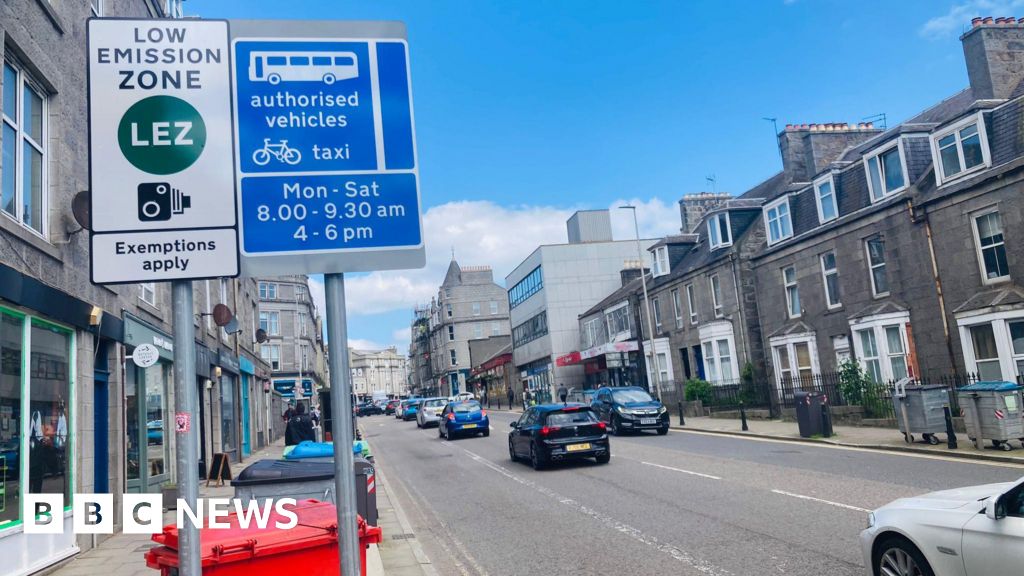Aberdeen and Edinburgh have become the latest Scottish cities to enforce their Low Emission Zones (LEZs).
They join Glasgow and Dundee in putting restrictions on the types of vehicles allowed in city centres to help to tackle air pollution.
The two cities have gone live exactly a year after Glasgow launched its scheme on 1 June 2023.
All three zones officially started two years ago, but a “grace period” was enacted to give people time to prepare for full enforcement in 2024.
Now live, the council schemes will fine any vehicles that enter the zones if they are not compliant.
The Scottish scheme broadly affects diesel cars and vans registered before September 2015 and older petrol vehicles registered before 2006.
Non-compliant vehicles face an initial fine of £60.
Like a parking ticket, the fine reduces by 50% if it is paid within the first 14 days.
If a vehicle re-enters the LEZ within 90 days of its last breach, the penalty charge will double.
Fines will continue to double until reaching a maximum of £480 for cars and light goods vehicles and £960 for buses and HGVs.
The aim of the zones is to reduce pollution and the associated health risks.
Jillian Evans, head of health intelligence at NHS Grampian, said getting all four zones up and running was a welcome move.
“If you listen to the World Health Organization (WHO) when they stress the risks to human health as a result of air quality, then doing anything we can to reduce vehicle emissions and particulate matter from diesel vehicles, then that is a really welcome intervention.”
She said some people might not realise there is an air quality problem because it can be “invisible”.
She added: “Even in the short term, exposure to higher levels of poor air quality can cause things like asthma attacks, it can increase your risk of cardiovascular events – it can have an immediate impact on your health.
“Long term – where people’s lives are actually cut short as a result of poor air quality – it is all about those long term exposures and what happens over your life as a result of you living or working in an area where air quality is poor.”
The leader of City of Edinburgh Council, Cammy Day, said full enforcement of the capital’s LEZ would help the city’s wider climate change goals.
“Edinburgh made a bold ambitious target of getting to net zero by 2030 and this is one of our priorities,” he said.
“The more we can do to promote this and get people to use active travel the better.”
He said the council had invested more in cycling and walking and had also begun a consultation on further extensions to the tram system.
Glasgow’s scheme suffered some teething problems – such as some of its own council vehicles not being eligible to enter the city centre.
The city council – which administers the zone – said only about two-thirds of its own vehicles were compliant and that it had issued 62 fines to its workers for entering the zone in council vehicles.
Mr Day said Edinburgh was currently “about 97.5% compliant” and hoped for full compliance by the end of the year.
Concerns from the business community in Glasgow have been echoed in Aberdeen and Edinburgh regarding the enforcement’s impact on footfall.
Mr Day said he had not seen any sign of this happening.
The Scottish government’s transport secretary, Fiona Hyslop, said lessons had been learned.
“Glasgow going first has given us the opportunity to learn lessons.
“One of those is how we help blue badge holders and now there is a system of exemptions – there are some very practical things that have been learned from Glasgow.
“And I am delighted that we are seeing Aberdeen, Dundee and Edinburgh joining Glasgow.”
She said the LEZ scheme was widely accepted.
“It has the support, not just of the politicians in Scotland, but the public,” she said.
“The latest opinion says more than 60% of the public think this is a good thing – good for health and good for quality of life in our cities.”

William Turner is a seasoned U.K. correspondent with a deep understanding of domestic affairs. With a passion for British politics and culture, he provides insightful analysis and comprehensive coverage of events within the United Kingdom.








